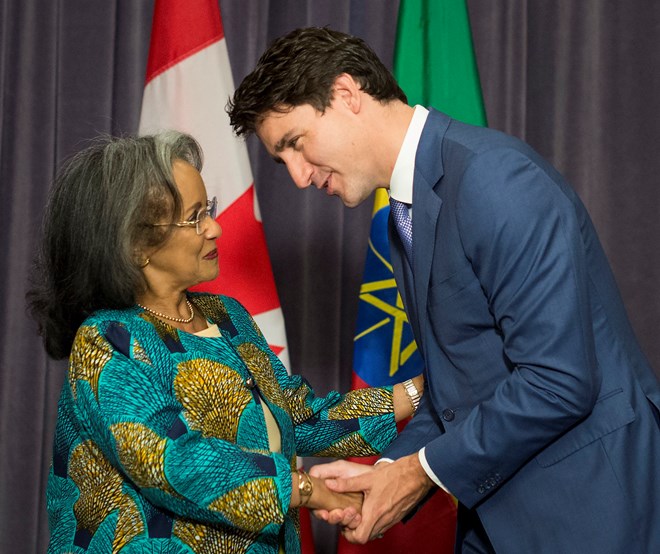
Monday June 10, 2019
SAMUEL GETACHEW

Last week’s Women Deliver conference in Vancouver announced boosts to Canadian foreign aid for maternal and child health, but the news was bittersweet for the many invitees from African countries, including Ethiopia, who said they could not attend because their visas were denied by Ottawa with little explanation.
The 15 delegates from Ethiopia were mainly government officials, including a slew of ministers, Ethiopia’s newly minted ambassador in Ottawa and the country’s first female president, Sahle-Work Zewde . Left out, however, were noted activists and health professionals.
For members of the Ethiopian Talent Youth Association, the intervention of Canada’s ambassador to Ethiopia, Antoine Chevrier, allowed them to attend as speakers at the conference. Amy Mills, a spokesperson at Global Affairs Canada, confirmed the ambassador’s involvement to support the applicants, but would not comment on specific applications due to privacy issues.
“He provided support to applicants to ensure their participation to Women Deliver was clear in their visa application,” Ms. Mills said. “Support was provided to all legitimate participants who needed it.”
Lemi Belay, a gynecologist and noted expert on reproductive health with St. Paul’s Hospital Millennium Medical College in Addis Ababa, was not so lucky. Despite his credentials, status and extensive travel to international destinations with little difficulty, his application was rejected.
“I was not given an explanation to why my application was rejected,” he said. “I provided all they asked, including an official invitation, support letters and a plane ticket but I was turned down and I still do not know the reason.”
This is not the first time foreign visitors have reported troubles obtaining visas required to travel to Canada for tourism, school, business or to see their families. Last year, The Globe and Mail reported a steady rise in the refusal rate for temporary resident visas, increasing to 26 per cent in 2017 from 18 per cent of the total number of applications in 2012 (excluding student visas). The highest refusal rates were clustered among applicants from Africa and the Middle East, including Somalia, Yemen, Syria and Afghanistan.
Ethiopia has been applauded for its appointment of women to key positions, including to the top of its judiciary, as head of state and for its gender-balanced cabinet that emulated Canada’s – a move that earned praise from Prime Minister Justin Trudeau. The country has also been getting kudos from the international community for strides it is making in the areas of public health, human rights, youth engagement and food security under Prime Minister Abiy Ahmed.
Metti Serafina, a young medical student and a self-described “intersectional feminist” was one of the few Ethiopian activists and non-governmental officials that attended the conference. But she was lucky, as she applied on a diplomatic passport. She said she valued the opportunity.
For her, “the idea and fear of being token-ized should never stop us from taking that seat at the table. It should drive and motivate us even more to talk to our communities, bring everyone’s ideas to the table.”
Oluwaseun Ayodeji Osowobi of Nigeria took her frustration at not being granted a visa to Twitter, and put Immigration, Refugees and Citizenship Canada on notice.
“I am a 2018 Women Deliver fellow scheduled to be in Vancouver in June & the organizers sent all the documents required for visa application. I applied for a Canadian visa & I was denied on the account that they were not sure I’d return to my country,” she tweeted. “Then, we found out that EVERY 2018 Nigerian WD young leader was denied visa by the Canadian Immigration. Our application probably was not reviewed based on merit but on nationality. Why?”
After her tweet was retweeted dozens of times, she and her colleagues were all granted visas.
Hannah August, the spokesperson of Women Deliver, acknowledged the limits of visas for some applicants.
“We have people from over 165 countries registered for the conference, but we know that visa challenges limited participation. For those who weren’t able to join, their absence is felt and their presence is missed, but we hope they’re still participating through WDLive and satellite events,” she said.
With a report from Michelle Zilio in Ottawa